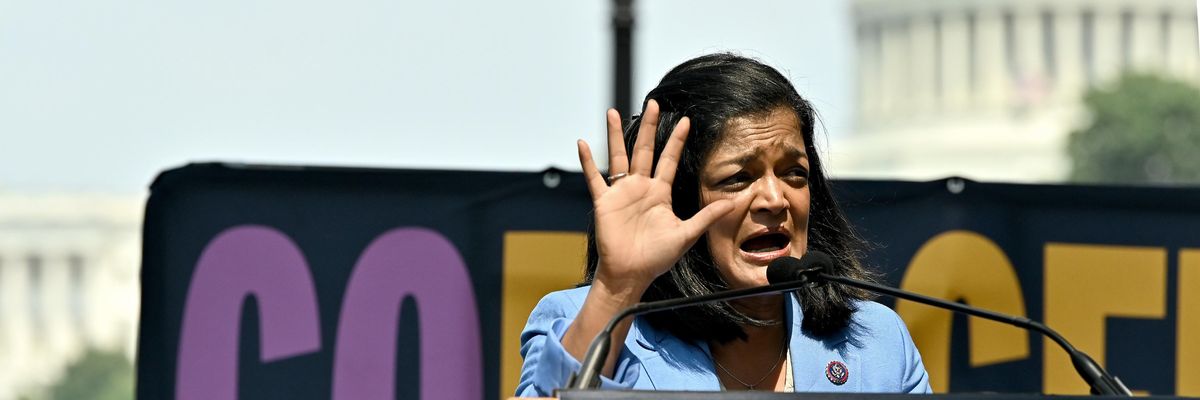Rep. Pramila Jayapal of Washington is urging her fellow congressional Democrats and President Joe Biden to agree on at least $3 trillion in safety-net and climate spending in their emerging reconciliation package, a push that comes as right-wing lawmakers are attempting to water down the package and strip it of key progressive priorities.
"We are fighting for something that will benefit the entire country."
"We have the House, Senate, and White House," Jayapal, the chair of the 96-member Congressional Progressive Caucus (CPC), tweeted late Sunday. "This is our opportunity to invest in child care, healthcare, climate action, paid leave, education, housing, and our roads."
"We don't have to leave some of these popular things behind," she added. "We can do all of it."
In an interview with the Associated Press late last week, Jayapal argued that Biden's proposed compromise of between $1.9 and $2.2 trillion--down from $3.5 trillion over 10 years in the original Build Back Better plan--is "too low" and said she wants the top-line figure to be closer to $3 trillion. Jayapal and other progressive lawmakers have repeatedly stressed that they view $3.5 trillion in spending as a significant compromise, given that they initially advocated for around $6 trillion.
"We are fighting for something that will benefit the entire country," the Washington Democrat told AP.
Related Content
Jayapal Says There's Nothing 'Moderate' About Tanking Medicare Expansion, Climate Action
Jake Johnson
Jayapal's latest comments came as several corporate-backed Democrats are working to pare back their own party's reconciliation package by imposing more strict means-testing on the bill's social and climate programs, slashing billions in funding, and attempting to completely remove benefits that progressives view as essential.
"Sinema is out of touch with her constituents and with what's happening across the globe on climate."
Axios reported last week that Sen. Joe Manchin (D-W.Va.) is telling colleagues that they must choose just one out of three proposed investments--the expanded child tax credit, paid family medical leave, or child care subsidies--and cut out the other two. Manchin has also voiced support for total spending of $1.5 trillion, a proposal that--according to the Economic Policy Institute--would support nearly 2 million fewer jobs than the original Build Back Better plan.
Sen. Kyrsten Sinema (D-Ariz.), for her part, is reportedly pushing for $100 billion in climate-related cuts from the reconciliation package--an effort that environmentalists immediately rejected as a "cruel and unfathomable" non-starter.
"Sinema is out of touch with her constituents and with what's happening across the globe on climate," Varshini Prakash, executive director of the youth-led Sunrise Movement, said in a statement last week. "Maybe if she actually took the time to speak to the people of her state, she'd realize how much their families need her to deliver action on climate."
Speaking to CBS News last week, Jayapal said that while progressives don't have a "red line" on the top-line price tag for the reconciliation bill, their support "depends on what's in there."
"The way that we came up with $3.5 [trillion] originally was by saying, 'This is what we want to include,'" said the CPC leader. "We would be willing to trim the number a little bit by cutting back the years for some of these programs, but we want to make sure our priorities as we've articulated them are all contained within the bill."
"We can't pit child care against pre-K. We can't pit pre-K against climate change. We can't pit housing against immigration," Jayapal added. "So all of these priorities need to be in there, and I think we're kind of coalescing around that, but obviously it does depend on what's in there, how it's structured, and how much money it will cost."





